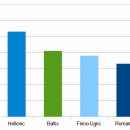 |
‘To be good in’ vs. ‘to be good at’ in English
When you want to express that you are well capable of doing something, the usual collocation is “to be good at something”, (...)
July 30, 2014 – Jakub Marian – English
|
 |
“Look good” or “look well” in English
Sentences with the verb “look” (in the sense of “appear, seem”) have a different structure from what many English learners think. “Look” (...)
July 27, 2014 – Jakub Marian – English
|
 |
“Will” after “when” in English
We never use the future tense in time clauses (introduced by phrases like “after”, “as soon as”, “before”, etc.) in English. Should we (...)
July 24, 2014 – Jakub Marian – English
|
 |
Pronunciation of the Greek alphabet in English
Greek letters are widely used in mathematics and other fields of science. There are a couple of differences in pronunciation of the names (...)
July 21, 2014 – Jakub Marian – English
|
 |
“Get off”, “get out of” or “exit” a bus in English
One of the most common activities and still causing trouble—do we get off, out of, take off, or exit buses, trains, planes, and cars? (...)
July 20, 2014 – Jakub Marian – English
|
By the way, have you already seen my brand new web app for non-native speakers of English? It's based on reading texts and learning by having all meanings, pronunciations, grammar forms etc. easily accessible. It looks like this:
 |
‘Continue doing’ vs. ‘continue to do’ in English
Apparently, there’s a popular belief among English teachers in China that “continue to do” and “continue doing” mean two different things. (...)
|
 |
Names of numbers above 1000 in English
First, we should note that there is a certain oddity in modern English in the nomenclature for numbers like “one thousand million”, “one (...)
July 13, 2014 – Jakub Marian – English
|
 |
Percentage of the EU population able to hold a conversation in English (by various criteria)
In my visualization of the percentage of the EU population able to hold a conversation in English, I presented separate percentages for (...)
July 10, 2014 – Jakub Marian – English
|
 |
Genders in English – Are animals and things he, she, or it?
Unlike most other European languages, Modern English has no grammatical genders. When we speak about an inanimate object, we always refer (...)
July 6, 2014 – Jakub Marian – English
|
 |
The meaning of ‘nothing but’ in English
The meaning of “nothing but” in English is closely related to the usage of “but” in all/anything/everything but, which is more idiomatic, (...)
July 5, 2014 – Jakub Marian – English
|

